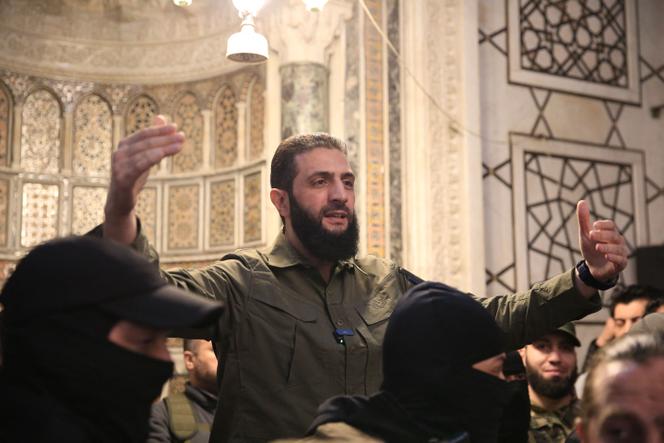


On Sunday, December 8, a few hours after the rebels penetrated Damascus, Abu Mohammed al-Jolani, the leader of the armed Islamist group Hayat Tahrir al-Sham (HTS), the driving force behind the offensive that eventually put an end to Bashar al-Assad's reign, entered the Syrian capital. After kissing the ground, the rebel leader, wearing a khaki shirt and pants, made his way to the majestic Umayyad Mosque, a monument of Sunni Islam and a treasure of Syrian cultural heritage.
Standing in front of the mihrab, the white marble niche that indicates the direction of Mecca, the man in his 40s delivered an address, celebrating "a victory for the Islamic nation, for prisoners, the tortured and those who have suffered injustice." The scene was photographed and filmed by a crowd of faithful worshippers and curious onlookers, smartphones in hand, capturing the rise of a political figure who bears very weighty responsibilities.
At the head of the most powerful rebel faction, the man who toppled the Ba'athist regime now holds the keys to the post-Assad era, or at least a significant part of them. A veteran of jihadist networks, with which he claims to have broken ties, a man designated as a "terrorist" by Western capitals and, at the same time, the architect behind the creation of institutions – endowed with rare effectiveness amid the Syrian revolutionary landscape – he embodies both the hopes and the perils of the now-open political transition period.
The promising side of his character was on show in the lightning offensive, waged from Idlib to Aleppo, Hama, Homs and, finally, Damascus – an attack carried out, as far as can be seen, without acts of vengeance or gratuitous violence. The operation was executed in 12 days, punctuated by carefully calibrated messages designed to reassure Syria's religious and ethnic minorities, such as the Kurds, Christians and Alawites – all of whom were inevitably worried by the Islamist surge. Jihad Yazigi, editor-in-chief of The Syria Report, a business newsletter, believed that "al-Jolani has done a flawless job."
Until then, discipline had not really been the strong point of the anti-Assad rebels. Their fighting spirit had often been marred by abuses, and undermined by internal divisions or even internecine struggles. While the regular troops' rout, as they often chose not to fight and fled, made HTS's task easier, the break with the errors of the past was no less clear-cut. "The revolution has moved on from a state of chaos and inconsistency to a more orderly system, in both the civilian and military spheres," said al-Jolani, in an interview with the American television channel CNN, as his troops seized Aleppo.
You have 61.8% of this article left to read. The rest is for subscribers only.
